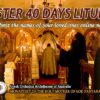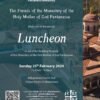The Nativity fast has begun and our Orthodox Church calls upon us to renew our spiritual struggle. So let us remind ourselves of the benefits of fasting.
Fasting from foods is intended as spiritual preparation for an experience of deeper communion with God. Each person is a unity of body and soul. A right spiritual diet and a discipline of fasting go together and strengthen each other. Just as prayer benefits not only the soul but also the body so also fasting from foods benefits not only the body but also the soul. Fasting and prayer make us more sensitive to God’s personal presence. At important times of their lives the Prophets fasted and prayed. So did Jesus, the Apostles, Saints and Church Fathers.
Fasting must be undertaken willingly and not by compulsion. God doesn’t need our fasting. We don’t fast as a kind of personal punishment for our sins. We cannot pay God back for sins but we can only confess them to Him to receive forgiveness. Fasting with a willing spirit and not just with an attitude of fulfilling a religious obligation means that we keep the purposes of fasting always before us which is to develop self-control and to remember God and His Kingdom. That way we fast not only in what we eat but also in how much we eat. Fasting is simplicity of eating. We leave the table not with loaded stomachs. Being a little hungry during the day becomes a constant reminder of God, of our dependence on Him, and of the fact that the Lord alone can give us “food that lasts for eternal life” (Jn 6:27). In fasting and prayer, he reveals Himself to us as our true food and drink.
Let us now listen to what the fathers of the Church have to say about fasting.
Abba John the Dwarf said, “If a king wanted to take possession of his enemy’s city, he would begin by cutting off the water and the food and so his enemies, dying of hunger, would submit to him. It is the same with the passions of the flesh; if a man goes about fasting and hungry the enemies of his soul grow weak.”
Sr. Benedicta Ward, “The Sayings of the Desert Fathers,” (Kalamazoo, Michigan: Cistercian Publications, 1975), pp. 85-89
According to St. Gregory the Sinaite there are three degrees in eating: temperance, sufficiency, and satiety.
Temperance is when someone wants to eat some more food but abstains, rising from the table still somewhat hungry.
Sufficiency is when someone eats what is needed and sufficient for normal nourishment.
Satiety is when someone eats more than enough and is more than satisfied.
Now if you cannot keep the first two degrees and you proceed to the third, then, at least, do not become a glutton, remembering the words of the lord: “Woe unto you that are full now, for you shall hunger” (Lk. 6:25). Remember also that rich man who ate in this present life sumptuously every day, but who was deprived of the desired bosom of Abraham in the next life, simply because of this sumptuous eating.
St. Nicodemos of the Holy Mountain, A Handbook of Spiritual Counsel
Beware of limiting the good of fasting to mere abstinence from meats. Real fasting is alienation from evil. ‘Loose the bands of wickedness.’ For give your neighbour the mischief he has done you. Forgive him his trespasses against you. Do not ‘fast for strife and debate.’ You do not devour flesh, but you devour your brother. You abstain from wine, but you indulge in outrages. You wait for evening before you take food, but you spend the day in the law courts. Woe to those who are ‘drunken, but not with wine.’ Anger is the intoxication of the soul, and makes it out of its wits like wine.
St. Basil, in his homilies on the Holy Spirit
Bodily purity is primarily attained through fasting, and through bodily purity comes spiritual purity. Abstinence from food, according to the words of that son of grace, St. Ephraim the Syrian, means: ‘Not to desire or demand much food, either sweet or costly; to eat nothing outside the stated times; not to give oneself over to gratification of the appetite; not to stir up hunger in oneself by looking at good food; and not to desire one or another sort of food.
The Prologue from Ochrid – by St. Nikolai Velimirovich (Volume 4, p 338):
Fasting is an exceptional virtue; it represses bodily impulses and gives strength to the soul to fight against the poisoning of the heart through the senses, and provides it with a remedy against any past poisoning. Fasting causes the mind to be cleansed constantly. It whithers up every evil thought and brings healthy, godly thoughts – holy thoughts that enlighten the mind and kindle it with more zeal and spiritual fervour.
Elder Ephraim of Philotheou Mount Athos, “Counsels from the Holy Mountain”




